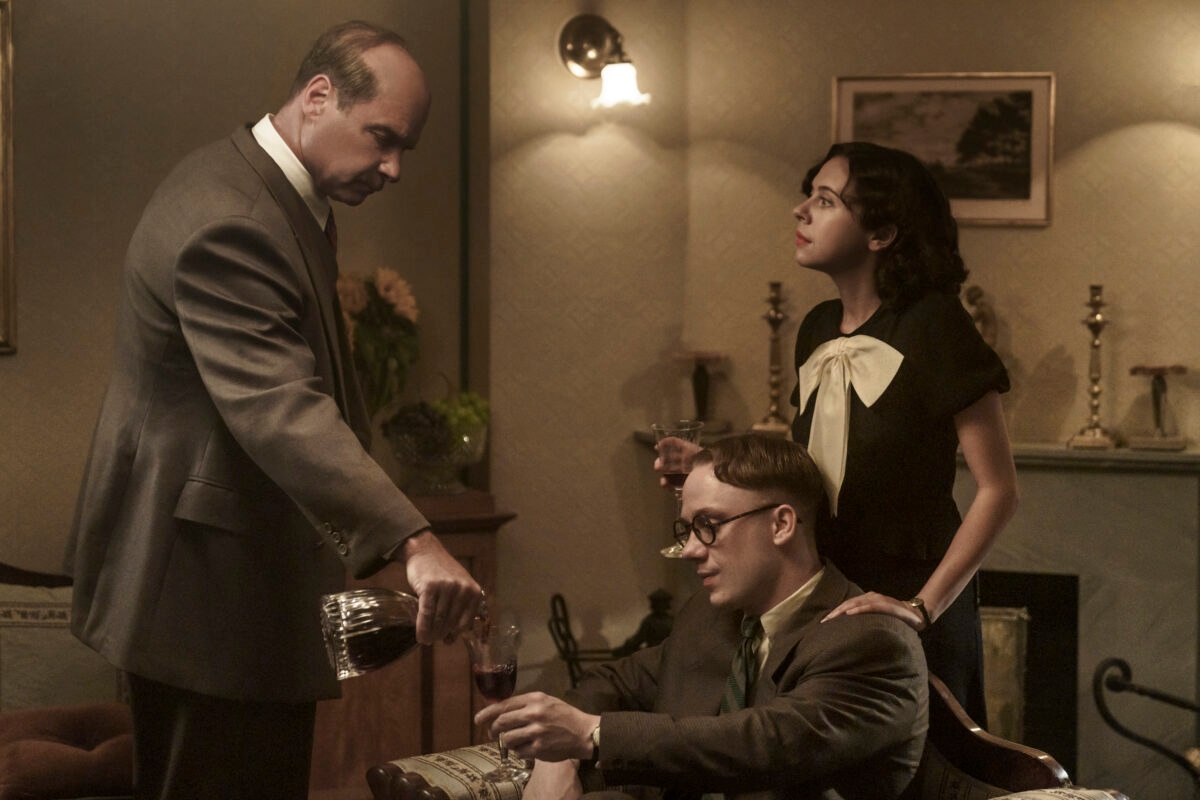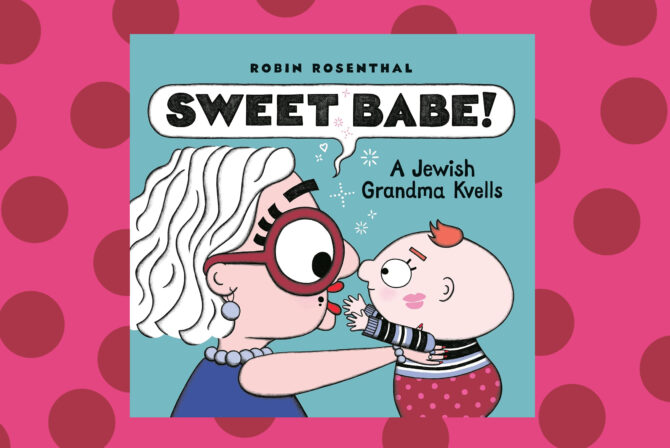When I first heard about “A Small Light,” a new series about the story of Miep Gies, the non-Jewish Holocaust hero who helped hide Anne Frank and her family in the attic, I had some concerns.
Telling these tales of Holocaust heroes sometimes feels like a way to decenter Jewish stories, to make them more palatable for non-Jewish audiences, to give them a hero they can see themselves in — one that is more “like them.”
Well, now that the first episodes of the NatGeo show are available for streaming on Hulu and Disney+, I’m glad to report that my concerns were unfounded. Yes, “A Small Light” gives us characters that we can see ourselves in, and many an act of heroism and bravery in the face of darkness — but they don’t just come from Miep, played by an enchanting Bel Powley (who is Jewish). We also get Otto Frank, played by Jewish actor Liev Schreiber, a Jewish father who hires Gies, a fellow refugee, when no one else would. There’s Anne (Billie Boullet) and Margot (Ashley Brooke), teenagers faced with the unimaginable. There are queer and Jewish Dutch resistance fighters, helped along by Miep’s husband Jan Gies (Joe Cole), who at first is reluctant to help his wife’s employer.
Each one of the characters in “A Small Light” is beautifully crafted and deeply draws you into a complex tale about what it means to be human, and what it means to be brave. There are no victims or heroes, just people making impossible choices over and over again in a picturesque Amsterdam — a city so charming and beautiful, but marred by the shadow of the Nazi regime and those indifferent to it.
The show’s success is thanks to the many intentional and wise choices from its creators. Tony Phelan and Joan Rater, the co-creators of “A Small Light,” are best known for their Emmy-nominated work on “Grey’s Anatomy,” and director and executive producer Susanna Fogel co-wrote the wonderful “Booksmart” and was also a director and executive producer on the extremely compelling “The Flight Attendant.” Together, they’ve created a show that doesn’t just tell an important story at an especially pertinent time, but that also makes for the kind of TV you can’t turn off.
Kveller spoke to the three creators about why Miep’s story is important today and how they incorporated moving Jewish moments into the show.
The following contains some mild spoilers for “A Small Light.” This interview has been edited and condensed for clarity.
Why do you feel like it’s important to tell this story right now?
Rater: Well, it’s frighteningly important for a lot of reasons. The obvious ones are that antisemitism and nationalism are on the rise. We’re living in a world that we kind of can’t believe. We’re living in this modern world, very similar to what Miep and the Franks were living in. They had modern appliances and airplanes and they couldn’t believe the things that were happening. That’s very similar to today. We visited the Anne Frank Museum, and they were saying how more and more people are coming and they have no idea about Anne’s story. So to reintroduce people to this really inspirational person through a different lens, through another inspirational person, Miep Gies, just felt like the right story at the right time.
Phelan: Especially today, when there are forces in this country actively trying to erase the Holocaust and Jewish identity, to erase anything they see as “other,” it’s the exact same thing. I think that we do ourselves a disservice by saying, “Oh, it’s different.” It’s not different. It’s the same thing.
The cast of the show is very Jewish. I spoke to Billie Boullet, who told me that at a certain point she found herself with the rest of the cast, singing Jewish songs together. She felt like she was in a room with more Jewish people than she’d ever been in before, outside her family. Was that casting intentional?
Phelan: Yeah, it was a conscious choice. We felt like it was important to be as true to the material as we could. And so we sought that out, but then found out after we’d cast Bel that Bel is Jewish. There was never a situation where we felt like we weren’t casting the absolute best person for the role.
The Hanukkah scene in episode five was so moving, to hear the prayer and see the candle lit — which works so well with the title of the show. Can you talk a little bit about making that scene and what it felt like on set?
Rater: It was beautiful. It was probably more beautiful to watch it in person. Andy Nyman who plays Mr. Van Pels made me cry every time. He got very emotional — just to really see the one candle lighting the faces of these people in hiding. It was very emotional.
Phelan: The scene is based on the celebration of Sinterklaas, which is how Dutch people celebrate Christmas, and that year Hanukkah [and Christmas] overlapped each other. And so it felt like a great opportunity as writers to see how these two different groups — Miep and her social circle and then the people in the annex — celebrated the different holidays. Miep and Jan ultimately felt more at home with the people in the annex than they did with with the people who were throwing this huge party with all the food they could imagine and all of the champagne they could drink.
You didn’t really include that kind of traditional Holocaust imagery that we’re used to seeing in TV shows and movies. What was the thinking behind that?
Fogel: The goal was really to show these people living their lives against the backdrop, or within a world, that was changing in scary ways. When they’re living their daily lives and walking past a swastika flag, they’re not stopping and staring at it and thinking about how disturbing it is. We had things in the background that sort of spoke to the world and the changes, but we didn’t necessarily want those images to be the point, because they become ordinary to people when they’re living in that world.
Rater: Also Amsterdam is gorgeous now, and it was gorgeous then. The tulips were coming up; spring was stunning in 1938. It was important to show that while the Jews in the city are living this horrible life where they’re having to go into hiding, or they have to flee their country, other people are going about walking by beautiful canals. That terrible juxtaposition was something we were conscious of as well.
Phelan: We also wanted to tear the cobwebs off of the way these stories are usually told and bring a kind of a freshness and a new take to it. That was very much in the back of our minds, because the last thing you want is for your audience to go, Oh, I know what this is. I’ve seen this before.
The show ends with a full episode that delves into the aftermath of what happened to the characters after the war ended — something that’s usually reserved for ending credits in many films and shows. Can you talk a bit about that decision?
Rater: I’m so moved by the fact that Miep is the one who discovered and saved the diary, and that she saved it for Anne, who she fully believed was coming home. She didn’t read it until long after it was published — she just couldn’t bear to. Anne’s diary is so important to the story, and so we wanted to show how she discovered it. How it happened is so brutal — the Nazis threw the briefcase, that’s where Anne kept it, and it was just on the floor.
Miep started as Otto’s employee, and he came back to her and Jan at the end of the war and ended up living with them for seven years. That fact is very moving to me. They were people who went through a thing together and he felt he could be himself with them. They knew his family. The story was so much about Otto and Miep’s relationship, so I wanted to show where it went.
We were talking about how this younger generation doesn’t know much about Anne’s diary, but for my generation and generations before it, it was iconic. What was your connection to the diary, and how did you discover Miep’s story?
Rater: I read the book in school, and was always stunned by Anne’s writing and just by the depth of this person. I was stunned that somebody my age could be that profound.
In the ’90s I watched “Anne Frank Remembered,” which is a documentary that Miep was featured in, talking about Anne. Around the same time, the movie “The Birdcage” came out, so I watched those two films in the same week, and then I watched an interview with somebody about “The Birdcage” and they said, about Robin Williams, “Well, wasn’t he brave? To play a homosexual?” I remember sitting in my apartment thinking, wow, we’re really misusing the word brave. I think Miep is brave. I just saw bravery in this documentary.
From then on, I was just really taken by Miep’s practical, “of course, I should” [attitude] when she was asked by Otto to help hide his family. Behind that sort of instantaneous, practical “anybody would do it” [thinking] is a much richer story of somebody who really sacrificed themselves day after day after day. I wanted to understand who would do that.
What are you hoping that Jewish viewers get out of this show?
Fogel: You know, that’s interesting. I haven’t thought about it that way, even though I’m the Jewish one at this table. I wasn’t particularly observant growing up, and this is definitely the first time I’ve directed something that was explicitly about Jewish history. It just felt like a really human story.
I’m hoping that Jewish viewers can see all of the nuances and all of the sides of the story. I knew who Miep was just because we all heard about her, but you heard about her as this hero. I think a lot of the teachings that we are used to getting about the Holocaust are black and white in terms of whether people are the villains or the victims of the story. There’s a sense of victimhood around a lot of World War II conversations, especially within the Jewish community. This is a little bit of a different spin on that. These are fully formed people. I think people have to just watch them and absorb them as real human beings, and not people that are defined by what role they played in World War II. There’s just so much more to their story.
Phelan: The story of Miep and Jan is the story of these people who find themselves in an extraordinary situation and don’t consider themselves extraordinary. It’s just those little decisions that you make every day, that can lead you to a place where people would say that you were a hero, even though Miep never saw herself as one. Ideally, people will come out of watching the show and say to themselves, what would I do? And look at their lives and say, what can I do? What little choices can I make in my life, to just be a little more kind, or a little more empathetic?








